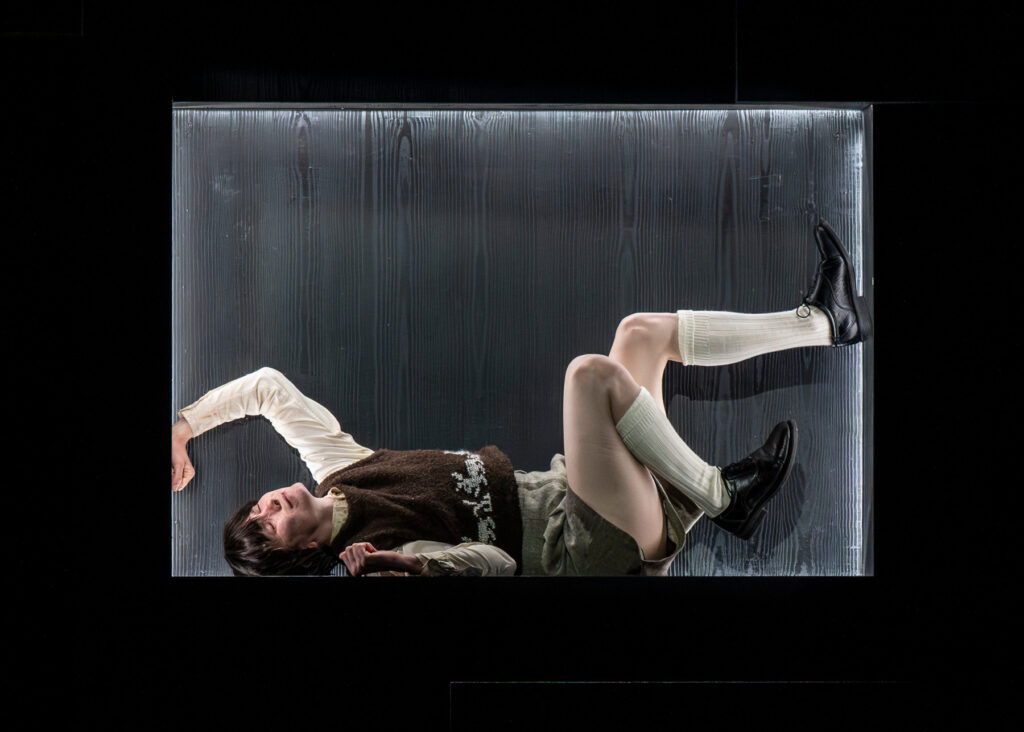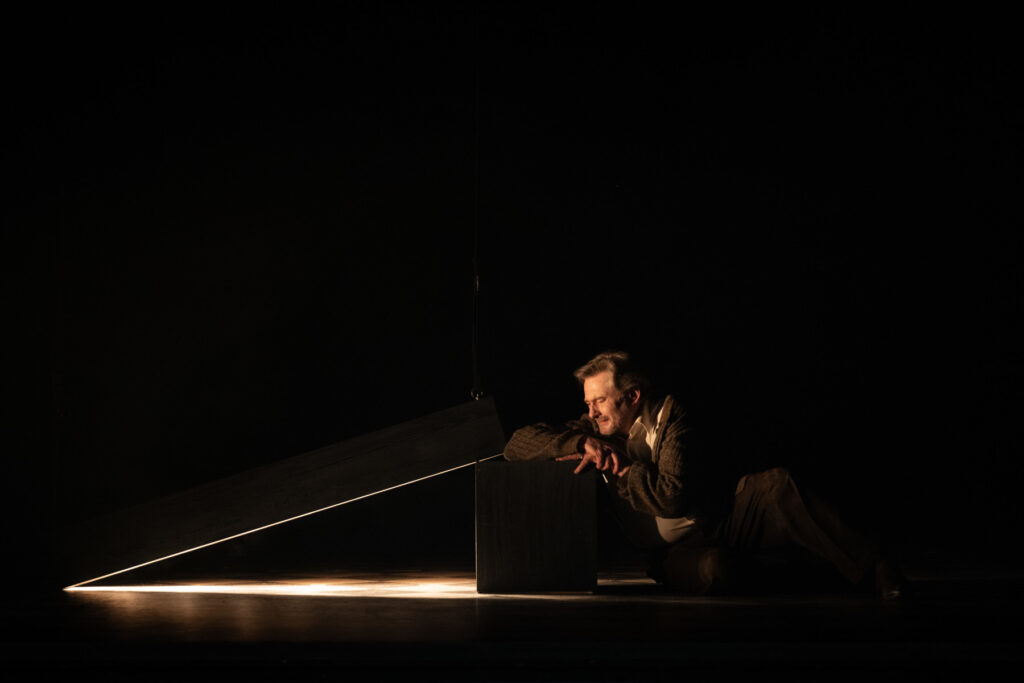Bare light bulbs, dazzling lighting rigs and handheld torches dominate Jenny Ogilvie’s new staging of Pelléas et Mélisande at Longborough Festival Opera. The production fulfils a long-held dream by the festival founder Martin Graham whose Wagner ring cycles established an English Bayreuth within this idyllic corner of the Cotswolds. Wagner to Debussy is a natural leap for the conductor Anthony Negus, who assisted Pierre Boulez in a WNO production in the early 1990s, and whose direction of the Longborough Festival Orchestra brings revelatory results.
Peter Small’s lighting creates startling effects and deep shadows, not least the gloom thrown onto the battlements of the castle – an oppressive fortress-like structure of misshapen blocks and steps which allows Yniold to hide in its box-like alcoves and eavesdrop on his stepmother and lover. They periodically occupy its recesses, as do King Arkel and Geneviève, their physical separation and skewed interactions underlining a family at its most dysfunctional. Onto a bare stage, designer Max Johns adds sheets of silver foil to evoke a forest pool, and for the tower scene a swing unravels to convey Mélisande’s hair tumbling down – a clever non-literal device in keeping with Maurice Maeterlinck’s focus on allusion and ambiguity. There’s a neat allusion to the Pre-Raphaelites when the dying Mélisande is housed in a glass-framed and flower-strewn case, although it’s a curious decision to suggest her baby is a source of light.

But light and dark, black and white are central preoccupations here, which costume designer Anisha Fields picks up on by clothing Mélisande first in black and then a wedding cake dress. Black and white contrasts become distinctly sinister when the Doctor emerges in a white gown and black surgical gloves. Then there’s the three silent servants who double both as light carriers and sleeping beggars, who from their austere uniforms look as if they might belong to some reform school for girls. At times they are a distracting presence, faintly ambiguous and sometimes bemusing. When Boulez once described Debussy’s Pelléas et Mélisande as the confrontation between“its severest realism and the most impalpable dream world”, he surely wasn’t believing this to mean something that caused total bafflement. But, of course, within the mythical world of Allemonde nothing is quite what it seems.
Things come into sharper focus with a mostly excellent cast. Canadian Italian baritone Brett Polegato gives a convincing portrayal of Golaud and makes the most of his character’s emotional arc, nicely differentiating initial cordiality, then suspicion and remorse (raving too in the closing minutes), and singing with handsome tone. There’s no shortage of menace too when forcing Yniold to spy on his wife. As Golaud’s young son from his first marriage, the role is superbly sung by a pure-voiced Nia Coleman, her recurring presence on stage when not singing adding to the work’s unsettling atmosphere.

Less convincing is Karim Sulayman’s Pelléas, whose pocket-sized tenor on opening night barely reached beyond the front stalls, though blossomed for his impassioned declaration of love to Kateryna Kasper’s jewel-voiced and unfathomable Mélisande. Her distracted air reveals little, but her singing is purposeful and beautifully poised – a shame Sulayman is no match for her. Elsewhere, bass Julian Close is a cavernous and sympathetic wise owl as Arkel, Catherine Carby a rich voiced and remote Geneviève and Pauls Putnins an unnerving Doctor.
In the pit, Anthony Negus draws wonderful textures and colours from his players, pacing the more dramatic episodes with a remarkable alertness to balance and tempo, allowing woodwind and brass to snarl ominously for Golaud’s paranoia at the close of Act 3. Overall, it’s a compelling staging, with Negus and Ogilvie creating a winning formula. In short, one of Longborough’s best.
David Truslove
Pelléas et Mélisande
Composed by Claude Debussy
Libretto based on the play of the same name by Maurice Maeterlinck
Cast and production staff:
Pelléas – Karim Sulayman; Mélisande – Kateryna Kasper; Golaud – Brett Polegato; Arkel –Julian Close; Geneviève – Catherine Carby; Yniold – Nia Coleman; Doctor – Pauls Putnins; Servants – Ariathney Coyne, Mak Korda, Rebecca Wield
Director: Jenny Ogilvie; Designer: Max Johns; Costumes – Anisha Fields; Lighting: Peter Small; Dramaturgy: Charlotte Farcet; Longborough Festival Orchestra; Conductor: Anthony Negus.
Longborough Festival Opera, Moreton-in-Marsh, 28 June 2025. Until 10 July
Top image: Karim Sulayman (Pelléas) and Kateryna Kasper (Mélisande)
All photos © Matthew Williams-Ellis